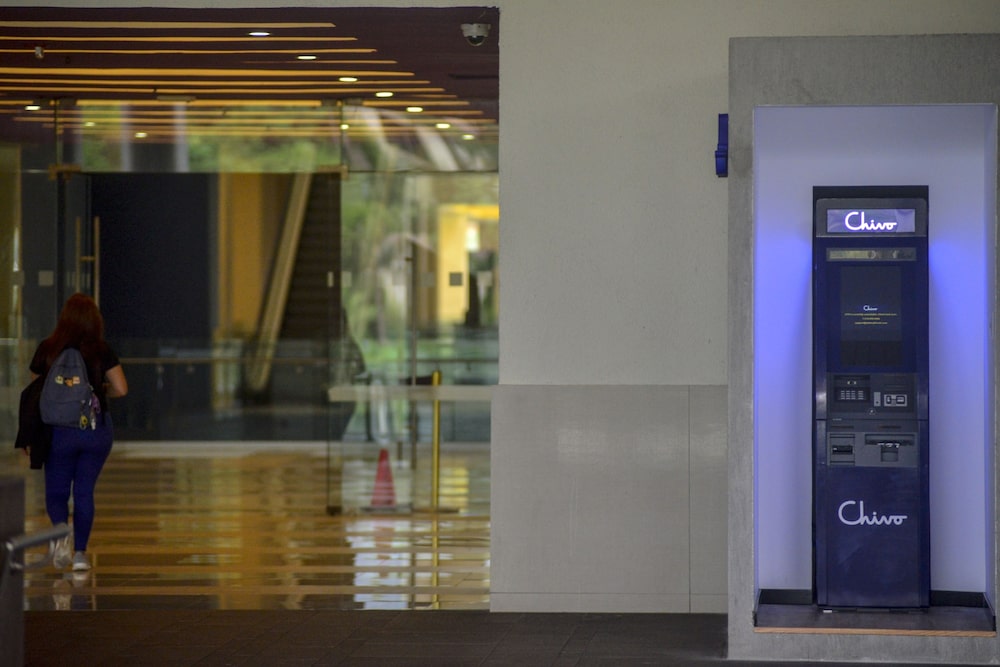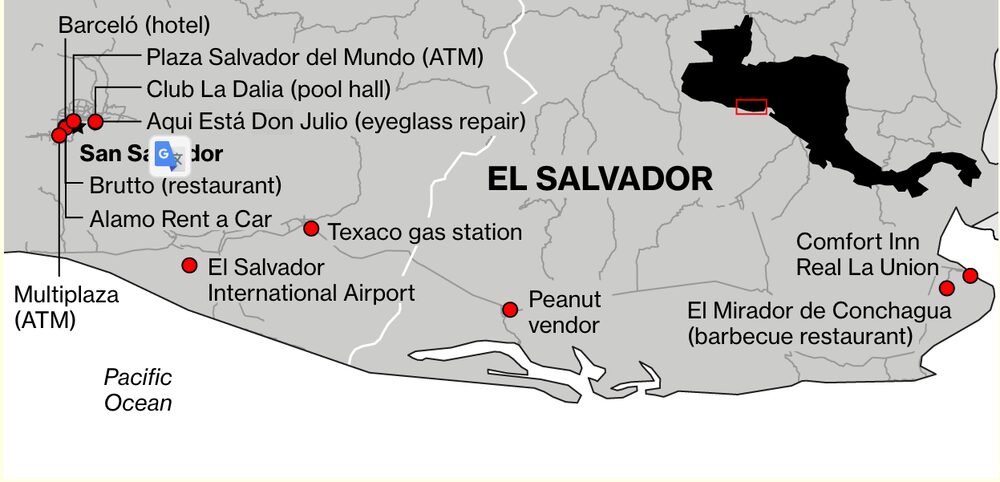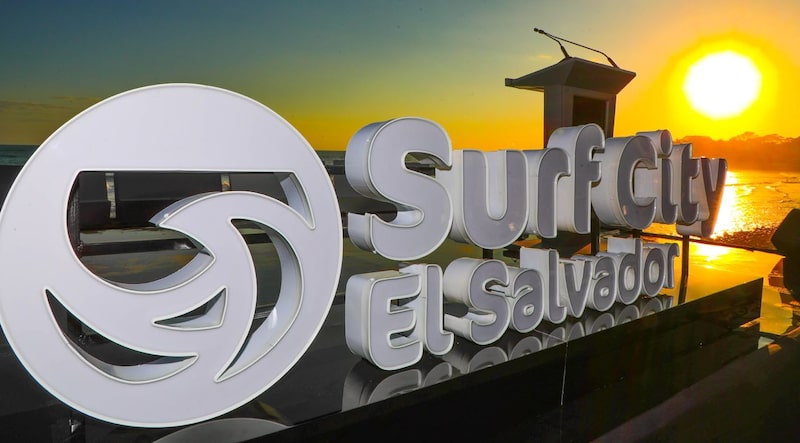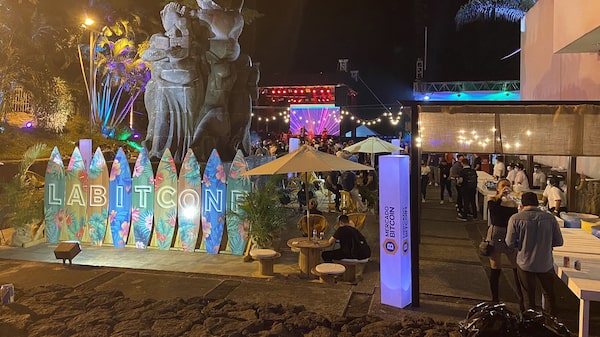Bloomberg Markets — The sign at El Salvador International Airport beckons like a message from the future. “Chivo,” it reads in slick blue script. Slang for “cool,” the word signals that Bitcoin (BTC) are welcome at passport control, along with the almighty dollar and credit card.
So begins my journey—and experiment. For five days, I’m trying to pay my bills only in Bitcoin. El Salvador is the ideal laboratory. In September it became the first country to declare Bitcoin legal tender, which means all businesses should accept it as a form of payment.
On this Monday in February, the airport cashier stands before me, ready to accept the $12 entry fee. On her shirt she wears the El Salvador coat of arms, which features its famed volcanoes and motto: “God, Union, Liberty.” It’s a fitting image for the dream of cryptocurrency, which seeks to disrupt the world financial system.
I wave my iPhone, packed with Bitcoin ready to show their value as an honest-to-goodness medium of exchange. Then the official interrupts my reverie. “I’m sorry, sir,” she says. “Only cash or credit.”
It turns out that Chivo, El Salvador’s Bitcoin-processing system, isn’t so cool after all. Its point-of-sale device, a white gizmo that looks like a credit card reader, isn’t working. Something about the internet signal. I charge the fee to my Visa card. Score one for international banking, zero for the digerati.
It’s disappointing, because the trip took some serious prep. Bitcoin and other cryptocurrency, of course, live on the web; they’re merely lines of code, recorded on that grand public online ledger known as the blockchain.
But you can’t leave home without the digital equivalent of a billfold. I’d loaded up my Wallet of Satoshi, which bills itself as “the world’s simplest Bitcoin lightning wallet.” It’s a phone app that stores digital currency information, including the secret key that unlocks the coin, enabling me to transfer it to others in exchange for actual stuff. I also have backups: digital wallets from other companies—Coinbase Global, Muun Wallet, and Strike.

Each Bitcoin is trading for $37,000. I’d taken 0.027 Bitcoin, the equivalent of $1,000. Or you can break it down into the smallest cyberunit, the Satoshi, named after Satoshi Nakamoto, pseudonym of Bitcoin’s presumed developer. There are 100 million Satoshis, or Sats, to a Bitcoin. How many did I bring? Do the math, and it comes to about 2.7 million. (For extra credit, convert into euros and pounds.)
Crypto, of course, has wild price swings. I arrived in El Salvador the same week that Russia invaded Ukraine. If I’d gone the following week, my 0.027 Bitcoin would’ve been worth $1,200.
“It turns out that Chivo, El Salvador’s Bitcoin-processing system, isn’t so cool after all. Its point-of-sale device, a white gizmo that looks like a credit card reader, isn’t working. Something about the internet signal. I charge the fee to my Visa card. Score one for international banking, zero for the digerati.”
As a Bloomberg News correspondent in Latin America, I’m on familiar ground. I’ve been visiting El Salvador for work and leisure for more than a decade. Since 2001 the country has used the U.S. dollar as its currency. Now, President Nayib Bukele, a 40-year-old populist, is promoting crypto-friendliness to spur travel and investment. He’s even been betting public money by trading Bitcoin on his phone. (By some accounts, he’s been losing.)
The Latin American country of 6.5 million—about the size of Massachusetts, in geography and population—may seem an odd choice for any kind of digital gamble. It’s long been known for its poverty and violence. On a single Saturday in March, street gangs killed 62 people, leading the government to declare a state of emergency. One of the bloodiest days in decades, it marked a major setback in a previously successful effort to lower the country’s infamous murder rate.
For my itinerary, I’ll spend two days in the capital of San Salvador, then drive the Pacific coastline to the Gulf of Fonseca, known for its wildlife and mangrove swamps.
There the government wants the region to become the new home of Bitcoin City, a jurisdiction free of income and capital-gains taxes, the “Singapore of Latin America.” The spectacular Conchagua volcano will provide electricity for Bitcoin “mines,” the vast server farms where coders create coins and verify and track transactions for the online ledger. Also, the beaches are spectacular, and I’m on an expense account.

Outside the airport, I approach a dozen cab drivers who are chatting and waiting for fares. I pop the question: “Will you take my Bitcoin?” Two throw up their arms and walk away. One says he knows a guy who does, but he’s not here. The rest ignore me and continue their conversations.
I go with a driver in a white Toyota van. He’ll take me to my hotel for $30—actual, not digital dollars. “Most people prefer cash, and almost no one asks if they can pay in Bitcoin,” says Saul Escobar, 55. “The system fails a lot, and lately it’s been really slow. There was a lot of enthusiasm last year, but it’s died down.”
In the hour it takes to exit the airport and reach my hotel, the Bitcoin in my phone falls 2% in value. I decide to stop checking.
The Barceló hotel seems promising. It’s in the Zona Rosa, an area known for its cosmopolitan restaurants and nightlife. Wendy Lopez, the receptionist, has been using cryptocurrency since 2018 on the advice of her brother, an information tech pro in Uruguay. Her crypto gains even helped her pay for an online course in financial markets.
Lopez fetches the Chivo point-of-sale device. She types in what I owe—505,842 Satoshis, or $185—for two nights. A square QR code appears. I open my wallet, enabling access to my camera, and run the lens by the code.
My phone’s screen turns green with a check mark, the universal symbol for success. “Payment Sent,” a message reads. Or is it? The device doesn’t print a receipt. A bad sign. Check back tomorrow, Lopez tells me. (About 24 hours later, the transaction will go through.)
For lunch the following day, I meet photographer Cristina Baussan, who works in San Salvador and Port‑au‑Prince, Haiti. She’ll be documenting much of my journey. We head to Brutto, a chic new Asian fusion restaurant popular with politicians, investors, and business executives.
Near a balcony with a view of rolling green mountains, I order an Alaska roll and crispy Brussels sprouts doused in a soy and maple sauce; my colleague asks for salad with watercress, falafel, and quinoa. It sets us back $60, or 163,821 Satoshis.
Natalia Avilés, the assistant manager, comes for our bill. She grew up in San Salvador, speaks fluent English, and studied hospitality in Switzerland and Spain. She lets on that a recent, swanky party paid a $1,000 tab in crypto. “A lot of people come to the restaurant to pay with Bitcoin, and it’s exciting to see them excited,” she tells us. “Having Bitcoin in your restaurant opens doors and gives people a reason to come.”
Avilés brings the Chivo point-of-sale gadget to our table. As in the hotel, I scan it and get the all-clear check mark on my phone, but no receipt. I try again. No luck. I pay with my Visa card. Avilés and I exchange phone numbers, in case there are further issues.
Then I hit the automatic teller machines, some of the hundreds of blue-and-gray Chivo-brand Bitcoin ATMs across the country that convert Satoshis from my app into cash, and vice versa.
In the Plaza Salvador del Mundo, home of an iconic monument showing Jesus atop the world, I walk up to an ATM. Like many of the busiest ones, it has an attendant, who tells me it’s out of cash. I call an Uber and head to Multiplaza, a Latin American mall chain that would look at home in Westchester County or on New York’s Long Island, with its Carolina Herrera, Forever 21, and Victoria’s Secret outlets.
Just inside, the Chivo ATM near a Starbucks has no cash, the ATM attendant tells me. She shares a tip: Check out the underground parking garage. I head into the bowels of the mall. The ATM screen’s blue light illuminates a dark corner near a doorway. It’s locked and loaded with cash, the attendant says.
tap the screen, enter my phone number, and verify my identity with a text. A QR code pops up. I scan it with my phone. And wait. The attendant tells me transactions can take more than an hour. Two people lined up behind me hear her and walk away.
My phone’s screen turns green, and I see the lovely check mark. “Sell complete,” reads the message on the screen. “0.00105188 Bitcoin sold, and 40 USD dispensed. We appreciate your patronage and look forward to your next transaction.” I grab my two $20 bills, as if I’d won a slot machine jackpot.

At a street market in downtown San Salvador, workers push wheelbarrows through traffic as steam rises from the hot pots and sizzling grills of food vendors. Hundreds of merchants hawk mobile phones, gym shoes, and other bric-a-brac in outdoor booths.
On that Wednesday morning, Julio Rosales, 76 and wearing tinted shades, sits inside his eyeglass repair booth. It’s called Aquí Está Don Julio, or “Here Is Mr. Julio.” In his personal digital wallet, he tells me, he has $30 worth of Bitcoin. The government gave it out gratis in September as part of its national experiment.
But Don Julio doesn’t accept crypto for repairs. “People lost interest in it because the price fell,” he says, taking a break from fixing a pair of mangled glasses. “It’s not promoted well, so people don’t know how to use it. No one has ever asked me if I accept Bitcoin, and few businesses around here do.”
Shortly after noon, I head through the swinging saloon doors of Club La Dalia, a pool hall alive with salsa music. A dozen men, most over 60, shoot games of 15-ball pool on the tables lined up around the bar. Under a clock with Roman numerals, a collection of photos, most in black and white, captures generations of pool and card sharks doing their thing. Around since 1937, La Dalia has a cash-only vibe.
And, yet, Carla Barrios, a 5-foot-tall dynamo darting from the bar to the back office, stops to tell me otherwise. Not only does La Dalia accept Bitcoin, but Barrios and her nephew are also creating their own line of nonfungible tokens, or NFTs. These one-of-a-kind digital images, which can be bought and sold like crypto, will reproduce the period photos on the wall.
I play an hour of pool with a retired schoolteacher and pay 5,500 Satoshis, $2.20, for two sodas. The transaction from my iPhone to La Dalia’s clears almost instantly. “What a crazy world, this crypto stuff,” says Barrios, 34.
As I walk out, my phone vibrates. It’s a WhatsApp message from Natalia Avilés, the restaurant manager from Brutto. It turns out I triple-paid for lunch, twice with Bitcoin and once with Visa. It came to $180 for a $60 meal. She’s working on reversing the Bitcoin transactions.
That afternoon, I head to the wilds of Conchagua, future home of Bitcoin City. The two-lane road from San Salvador winds for 130 miles, past volcanoes and pastures that climb up slopes, meeting scorched fissures where lava once flowed.
It’s 90F at 4 p.m. when, on a lark, I stop at a food stand with a thatched roof held up by tree branches. A young man in sandals and jeans approaches my car. He’s selling cashews and sugar-coated peanuts, while a boy plays in the dirt yard in front of his tin-panel house.
“By chance, do you take Bitcoin?” I ask.
“Yes, I do,” he replies. “Normally I have a sign out, but I forgot to put it up today.”
I’m sure he’s joking. Next, he’ll offer to sell me a Tesla. “Seriously?” I ask.
“Yes, seriously,” he says.
I buy a half-pound of cashews and a half-pound of peanuts for the equivalent of $7. The future-minded nut vendor, Oscar Atilio Lopez, 26, pulls out the Chivo Wallet app on his phone and shows me a QR code. I scan it. Seconds later, 0.00018836 Bitcoin leave my wallet and enter his.
Lopez tells me he’s already made an extra $300 by holding on to crypto from his sales and unloading it when the currency rallies. That’s roughly equal to the average monthly per capita income in El Salvador.
“It’s disappointing, because the trip took some serious prep. Bitcoin and other cryptocurrency, of course, live on the web; they’re merely lines of code, recorded on that grand public online ledger known as the blockchain.”
In the future Bitcoin City, my hotel—the Comfort Inn Real La Union—accepts crypto. But the system is down, so I head to El Mirador de Conchagua, a barbecue restaurant nestled in the foothills beneath the famed volcano.
Owner María Orbelina, 79, chops ribs on a plastic sheet draped over a wooden table, while chickens run around outside. “Bitcoin has no future here,” says one of her sons, Alex Zelayndia, a 57-year-old retired engineer who helps run the place. “I want dollars. If you get paid $25 in Bitcoin, it might be worth $20 tomorrow. A dollar has never failed me.”
I drive 15 miles to a small village where several dozen families fish for crabs and clams to eat and sell. A middle-aged couple rock in hammocks strung from the ceiling of their cinder block home, situated on a rocky road that leads to a mangrove swamp. Clelion Villalobos and her husband, Salatiel Bautista Villa, say government officials came to appraise their home, which could be part of a site for a new airport in Bitcoin City.
Bautista Villa, 61, says they don’t want to leave. “We’re familiar with life here, and I know my kids can play safely,” he says. “This is an honest town. We don’t even have a town drunk.” He uses a prepaid cellular flip phone, known as a frijolito, or “little bean,” which wouldn’t work as a Bitcoin wallet.
His wife doesn’t endorse crypto, either. “I don’t understand any of that stuff,” says Villalobos, 55. “I don’t even know how to read.”

BACK IN SAN SALVADOR, as I wrap up my trip, Alamo Rent a Car would like a credit card for my Kia SUV. So does the gas station, because its Chivo is down. “I’m sorry, sir, only cash or credit,” says an otherwise friendly hotel bartender when I try to pay for a $3 beer in crypto.
But there’s a bright spot. My now good friend, Natalia, the assistant manager at Brutto, has left me a WhatsApp message. She’s scored me a refund for one of my two extra Bitcoin payments. My wallet shows a credit for 152,000 Sats, about $56. I’m not whole, exactly. My wallet charges me about $4 in fees.
Rather than ask Natalia to fight for more money back, Cristina the photographer and I return to Brutto, so we can put the last extra crypto payment toward our lunch. Natalia throws in a complimentary dessert: three heaping scoops of Oreo ice cream with cookie shavings, Nutella, and popcorn on top. We consider ourselves square.
By Friday the final tally looks grim for crypto fans. Only 10 of almost 50 businesses had taken Bitcoin, amounting to $485 out of $1,700 I’ve spent. And only four crypto transactions—at the pool hall, the peanut vendor, a Starbucks, and a Caterpillar-brand T-shirt store—had been entirely seamless. My experience isn’t a fluke. In a recent Chamber of Commerce survey of 337 businesses, only 14% said they’d transacted in Bitcoin since September.
I’d also paid $40 in Bitcoin fees, such as levies for transferring the currency between Coinbase and my digital wallet. My Visa, by contrast, is paying me—$20 in cash-back rewards.
At the airport, on the way home to San José, Costa Rica, I see the familiar blue glow of the Chivo ATM. Figuring I could use some cash, I tap the screen, get a text, and punch in the numbers: QR code, scan, wait. “Payment Sent,” my phone says. The $40 has left my digital wallet. A blue orbit symbol appears on the ATM screen, blinking as it processes. I wait. And wait some more.
The machine spits out a receipt with a transaction number. Hooray, it’s successfully taken my 0.00105 Bitcoin. But there’s a catch. The Chivo machine has accepted my crypto, for sure. But it dispenses no cash. Zero. None. The Chivo has eaten my Bitcoin. I never see my $40 again.
--McDonald reports on Latin America for Bloomberg News. He’s based in San José, Costa Rica.
-- This article was originally published by Bloomberg Markets





